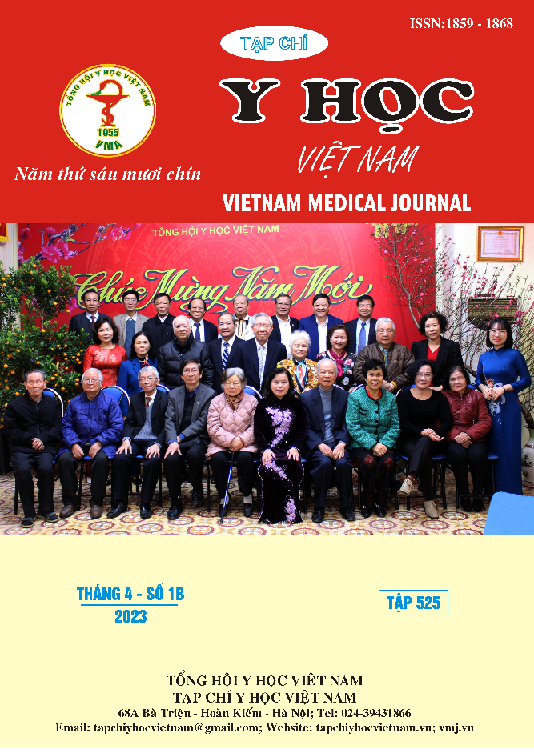SPHINCTER-PRESERVATION IN LAPAROSCOPIC SURGERY TREATMENT FOR LOW RECTAL CANCER
Main Article Content
Abstract
Introduction: Laparoscopic proctectomy preserving sphincter in rectal cancer is a topic that has attracted many study authors. This study was conducted to evaluate surgical and oncological outcomes in a group of patients with low rectal cancer with sphincter-preserving laparoscopic proctectomy. Materials and Methods: This is a prospective descriptive study on a group of patients with low rectal cancer according to Japanese criteria. This group of patients underwent sphincter-preserving laparoscopic rectal resection by the same technique performed by a single surgical team. Results: The total number of patients in the study was 35 patients including 68,6% men and 31% women, with a mean age of 65.07 ± 11.2 years. All 35 patients had tumors located below the peritoneal fold and mainly stage II (74.3%). The average operative time was 247.7 ± 46.5 minutes. The mean intraoperative blood loss was 28.3 ± 6.5 ml. Time for re-feeding after surgery is 5.3 ± 1.4 days. There were no complications during surgery. The total number of postoperative complications was 22.8%, but most of the complications were mild and there were no deaths. The mean postoperative time was 10.7 ± 2.8 days. The majority of patients discharged from the hospital gave good results 77.1%, there were no patients discharged with bad results. The results of postoperative follow-up showed that the group of patients had good results. Conclusion: Laparoscopic surgery for sphincter-preserving low rectal cancer of the above group of patients is safe, without intraoperation accident, and with few complications.
Article Details
Keywords
Sphincter-Sparing Colorectal Surgery, rectal cancer, laparoscopic proctectomy
References
2. Zhang Q, Liang J, Chen J, Mei S, Wang Z. Outcomes of Laparoscopic Versus Open Surgery in Elderly Patients with Rectal Cancer. Asian Pacific journal of cancer prevention: APJCP. Apr 1 2021;22(4):1325-1329. doi:10.31557/APJCP.2021.22.4.1325
3. Li Z, Xiong H, Qiao T, et al. Long-term oncologic outcomes of natural orifice specimen extraction surgery versus conventional laparoscopic-assisted resection in the treatment of rectal cancer: a propensity-score matching study. BMC surgery. Jul 25 2022;22(1):286. doi:10.1186/ s12893-022-01737-2
4. Seishima R, Miyata H, Okabayashi K, et al. Safety and feasibility of laparoscopic surgery for elderly rectal cancer patients in Japan: a nationwide study. BJS open. Mar 5 2021;5(2)doi:10.1093/bjsopen/zrab007
5. Japan ese Society for Cancer of the C, Rectum. Japanese Classification of Colorectal, Appendiceal, and Anal Carcinoma: the 3d English Edition [Secondary Publication]. Journal of the anus, rectum and colon. 2019;3(4):175-195. doi:10.23922/jarc.2019-018
6. Benson AB, Venook AP, Al-Hawary MM, et al. Rectal Cancer, Version 2.2018, NCCN Clinical Practice Guidelines in Oncology. Journal of the National Comprehensive Cancer Network : JNCCN. Jul 2018;16(7):874-901. doi:10.6004/ jnccn.2018.0061
7. Zhu Y, Xiong H, Chen Y, et al. Comparison of natural orifice specimen extraction surgery and conventional laparoscopic-assisted resection in the treatment effects of low rectal cancer. Scientific reports. Apr 29 2021;11(1):9338. doi:10.1038/ s41598-021-88790-8
8. Teurneau-Hermansson K, Svensson Neufert R, Buchwald P, Jorgren F. Rectal washout does not increase the complication risk after anterior resection for rectal cancer. World journal of surgical oncology. Mar 19 2021;19(1):82. doi:10.1186/s12957-021-02193-7
9. Liu C, Li X, Wang Q. Postoperative complications observed with robotic versus laparoscopic surgery for the treatment of rectal cancer: An updated meta-analysis of recently published studies. Medicine. Sep 10 2021;100 (36):e27158. doi:10.1097/MD.0000000000027158
10. Lohsiriwat V, Jitmungngan R. Rectovaginal fistula after low anterior resection: Prevention and management. World journal of gastrointestinal surgery. Aug 27 2021;13(8):764-771. doi:10.4240/wjgs.v13.i8.764


